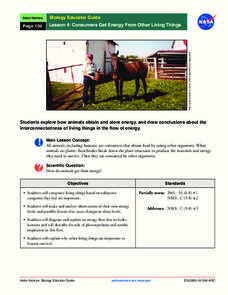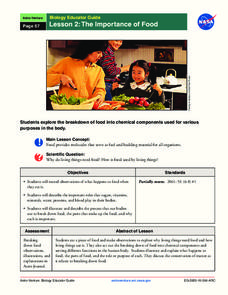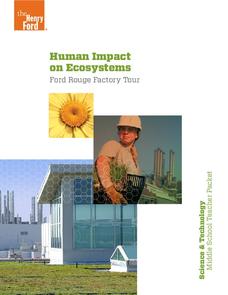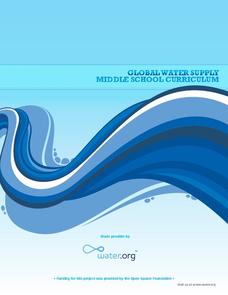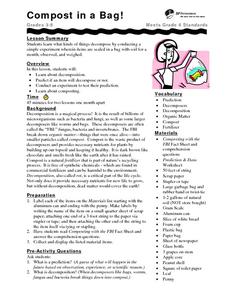NASA
Producers Make Their Own Food
During an inquiry-based lesson, scholars decide which variable to test and then design an experiment to determine the needs of producers. After two weeks, they complete a full analysis and research paper.
Omaha Zoo
Monitoring Amphibians
What sort of shoes do frogs wear? Open toad sandals. If your scholars want experience collecting field samples, this is the lesson for you. After learning the proper way to collect field samples, pupils catch amphibians to test for...
Curated OER
Sustainability and Extinction
Galapagos Penguins are the only penguins on earth that live north of the equator (in the wild). In this last lesson plan a discussion on how the Galapagos islands developed their populations and diversity sparks the introduction. Two...
Curated OER
Hedgerows
Hedgerows prevent soil erosion, capture pollutants running off fields, store carbon to help combat climate change, and provide homes for predators of many pest species. The biodiversity lesson begins with an activity that discusses why...
Curated OER
Artificial Selection
The second lesson in the series begins with a starter activity discussing wild versus domesticated animals. Then, scholars play a card game, with optional variations, to emphasize artificial selection. Next, they attend a field trip to a...
Curated OER
Darwin’s Bees
What do you call a bee born in May? A maybe! This first instructional activity in a series of four begins with a starter activity to get scholars thinking about the topic. Then a circus, or circuit of seven activities, show Darwin's...
NASA
Biology Training Conclusion
Gravity is just one consideration when determining human habitability on a new planet. The lesson connects four different units and starts with connecting the various systems: planetary systems, human body systems, etc. After scholars...
NASA
Consumers Get Energy From Other Living Things
How do plants and animals get their food? Learn about where energy comes from, how animals store energy, and aerobic respiration, in a lesson that allows scholars to diagram energy flows.
NASA
The Importance of Food
Pupils make observations while eating food. They act out the process of food breaking down in the body and the roles of various chemical components, such as sugar and protein. It concludes with an activity illustrating the process and a...
NASA
Biology Training Module
Are you a koalafied biologist? The lesson begins with research about human survival and our ecosystem. Then, an online training module simulates the effects of changes to the plants and animals in an ecosystem. Finally, scholars research...
Henry Ford Museum
Human Impact on Ecosystems
An environmenta science unit includes three lessons plus a cumulative project covering the ecosystem. Scholars follow the history of the Ford Rouge Factory from its construction on wetlands and how it destroyed the environment to its...
Chemical Education Foundation
Teacher's Guide to Science Projects
Do you find the idea of having a science fair with all of your students intimidating? Use a guide that provides everything you need to know to make project-based learning manageable. The resource includes options for four different types...
PricewaterhouseCoopers
Waste and Recycling: Recycling Paper
We take paper for granted, while thousands of trees are being made into the paper we toss in the trash. Start a dialogue about paper reduction and recycling in class, and share the negative effects paper production has on our ecosystem....
PricewaterhouseCoopers
Waste and Recycling: Recycling and Energy Recovery
Reduce, reuse, recycle, and recover. Young environmentalists learn about the overwhelming amount of garbage produced and discover better ways to minimize their impact on Earth by learning the difference between garbage and recyclables.
Water
Global Water Supply Middle School Curriculum
We take a steady shower stream and clean drinking water for granted, but in many countries around the world, the lack of water or a clean water supply is responsible for higher sickness and death rates. Taking a closer look at the water...
Community Resources for Science
A Whole New World of DNA and Proteins
Lead your young scientists into an exciting world as they participate in a role play and experiment focused on proteins and DNA. After researching the Central Dogma of Biology, individuals or groups participate in a classroom slide...
Curated OER
Testing for Life’s Molecules
Want to hear a joke about sodium? Na. Young scientists test various materials to identify if they include protein, starch, and glucose by using the Biuret test, iodine starch test, and Benedict's test respectively. After practicing with...
North Carolina State University
Exploring Genetics Across the Middle School Science and Math Curricula
Where is a geneticist's favorite place to swim? A gene pool. Young geneticists complete hands-on activities, experiments, and real-world problem solving throughout the unit. With extra focus on dominant and recessive genes, Punnett...
Curated OER
Grow an Alum Crystal
What an exciting lab experiment to conduct with your high school chemistry class! Crystals are formed naturally in the environment. However, allow your blossoming chemists to create their own unique crystals using alum and water. You may...
Curated OER
The Science of Microbes
Looking for an interesting text to share the world of microbes with your middle school classroom? The edition contains explanations, worksheets, experiments, discussions, and links to outside sources for a true and complete microbiology...
Curated OER
Get a Leg Up
Traveling through space is an amazing experience, but it definitely takes a toll on the body. After reading an article and watching a brief video, learners perform an experiment that simulates the effects of zero gravity on the human body.
National Library of Medicine
Electricity, Frankenstein, and the Spark of Life
Shocking! After viewing a short clip from the 1931 movie, Frankenstein and reviewing electricity references in Mary Shelley's novel, class members examine Luigi Galvani's and Alessandro Volta's observations on electricity and muscle...
Henry The Hand
Good, Clean Fun!
Henry the Hand leads youngsters on an exciting adventure through coloring worksheets, word puzzles, and comic strips on everything they need to know about preventing the spread of germs by washing your hands.
Education Outside
Compost in a Bag
Young scientists create a compost bag, predict changes, and after one month, examine the bag to observe the changes that have occurred.









